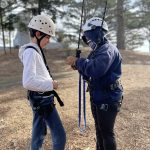“Come with me to get food,” Antonia shouts at me in Spanish from her pickup truck. “I’m still painting,” I shout back, but she insists. We’ve been chatting while we work and I like her, so I put my paint brush down and walk through the wooden framing of the house to join her.
We are volunteering with Self Help Enterprises in the Central Valley of California, in the small town of Gustine. There are ten families building houses here, each family putting in 40 hours of work per week to build their own and each other’s houses. This “sweat equity” serves as a down payment. Once they move in they start making monthly payments. But today each house is naked wood framing. Some of us Service Bussers are helping build platforms in the to-be attics where heating units will be stored, some of us are bracing the roof trusses, and some of us are painting the eaves before they get lifted up to the roof.
Antonia drives through the streets of Gustine and explains, “There was a bautismo [baptism] last night and there is a lot of food left. My brother helped roast the carnitas [pork meat] so it’s okay for us to take some.” We arrive at a house with lots of people milling around in the yard. “Buenos días”, Antonia greets people, “Buenos días”, they respond. There are coolers full of beans, carnitas, Spanish rice, salsa, and chicken. Antonia fills a couple of trays. “Now we can go to my house to heat it quickly before we return,” she says, and we leave.
We arrive at Antonia’s house and go inside to heat the food. By now I’ve realized she is getting this food for us folks from the Service Bus, even though we packed our own lunches. Antonia lives in a small trailer in a row of trailers. There’s a cat curled up in the living room. “This is my daughter’s bedroom”, she says, motioning towards the couch, “and that’s her pet.”
She quickly heats the food on the stove, including about 50 tortillas. With three tortillas per burner and four burners it takes both of us to turn them quickly enough to keep them from burning. Two of her children come in while we heat the food and I meet them. As we drive away, her youngest son is playing in the street with his neighbor friends “Watch out for cars” Antonia shouts lovingly as we leave.
Driving back to the construction site, I find out more about her work and life. She works full-time for a chocolatier in another town an hour away. Her husband Santiago works full time as well. In the evenings after work, she continues working on the houses until 8 pm. On Saturdays she works for ten hours on the houses and on Sunday she works however many hours she needs to complete their 40 hours for the week. I’m amazed at her work ethic. She tells me she doesn’t mind sacrificing a year of her life to have a better life.
When we return with food for everyone, we find that someone else has also bought tacos for the volunteers. We have more delicious food than we can eat. We’ve been working hard, but not that hard. And everyone keeps thanking us. For myself, I feel like we haven’t worked hard enough for them to treat us this well. I mean, it’s just been fun for me. But they are so grateful anyways. Antonia’s story, while extraordinary, is not uncommon. They are all making huge sacrifices to build these homes that they would be unable to afford otherwise.
Coming back to camp at the end of the day with leftover carnitas and rice and beans and tortillas, I think about the grace of receiving. I think that there is a dignity and privilege in being able to give to others whether it be time, food or something else. It made us feel good to help build houses, and it was a little hard for me to accept that these generous people of so little means would spend time or money on feeding us. But after today, it seems to me that not being able return a favor can be a kind of loss of dignity. It feels good to be able to give, and it takes a certain grace to be good at receiving. I want to get better at both.












